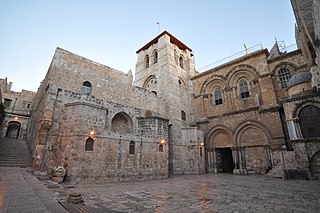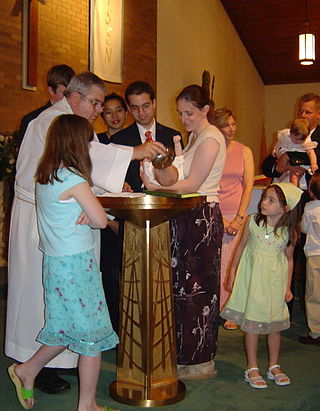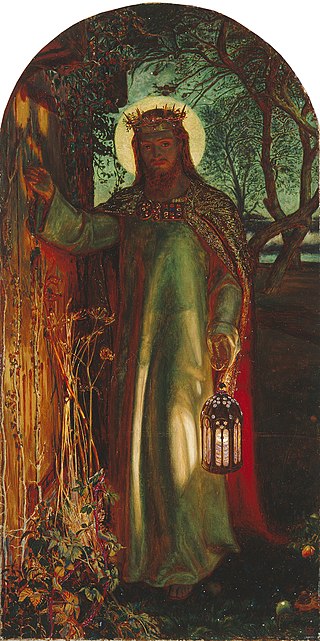To be born again, or to experience the new birth, is a phrase, particularly in evangelicalism, that refers to a "spiritual rebirth", or a regeneration of the human spirit. In contrast to one's physical birth, being "born again" is distinctly and separately caused by the operation of the Holy Spirit, and it is not caused by baptism in water. It is a core doctrine of the denominations of the Anabaptist, Moravian, Methodist, Baptist, Plymouth Brethren and Pentecostal Churches along with all other evangelical Christian denominations. All of these Churches strongly believe Jesus's words in the Gospels: "You must be born again before you can see, or enter, the Kingdom of Heaven" stated in John 3:6-7 in the bible. Their doctrines also mandate that to be both "born again" and "saved", one must have a personal and intimate relationship with Jesus Christ.

Christianity is an Abrahamic monotheistic religion based on the life and teachings of Jesus of Nazareth. It is the world's largest and most widespread religion with roughly 2.4 billion followers representing one-third of the global population. Its adherents, known as Christians, are estimated to make up a majority of the population in 157 countries and territories. They believe that Jesus is the Son of God, whose coming as the Messiah was prophesied in the Hebrew Bible and chronicled in the New Testament.

Infant baptism is the practice of baptizing infants or young children. Infant baptism is also called christening by some faith traditions.
Oneness Pentecostalism is a nontrinitarian religious movement within the Protestant Christian family of churches known as Pentecostalism. It derives its name from its teaching on the Godhead, a form of Modalistic Monarchianism commonly referred to as the Oneness doctrine. The doctrine states that there is one God―a singular divine spirit with no distinction of persons―who manifests himself in many ways, including as Father, Son, and Holy Spirit. This stands in sharp contrast to the doctrine of three distinct, eternal persons posited by Trinitarian theology.
The five solae of the Protestant Reformation are a foundational set of Christian theological principles held by theologians and clergy to be central to the doctrines of justification and salvation as taught by the Calvinism and Lutheranism branches of Protestantism, as well as in some sects of Pentecostalism. Each sola represents a key belief in these Protestant traditions that is distinct from the theological doctrine of the Catholic Church, although they were not assembled as a theological unit until the 20th century. The Reformers are known to have only clearly stated two of the five solae. Even today there are differences as to what constitutes the solae, how many there are, and how to interpret them to reflect the Reformers' beliefs.

In Christianity, salvation is the saving of human beings from sin and its consequences—which include death and separation from God—by Christ's death and resurrection, and the justification entailed by this salvation.

In Christian theology, justification is the event or process by which sinners are made or declared to be righteous in the sight of God.
The means of grace in Christian theology are those things through which God gives grace. Just what this grace entails is interpreted in various ways: generally speaking, some see it as God blessing humankind so as to sustain and empower the Christian life; others see it as forgiveness, life, and salvation.

Eucharistic theology is a branch of Christian theology which treats doctrines concerning the Holy Eucharist, also commonly known as the Lord's Supper. It exists exclusively in Christianity and related religions, as others generally do not contain a Eucharistic ceremony.

The Sinner's prayer is an evangelical Christian term referring to any prayer of repentance, prayed by individuals who feel sin in their lives and have the desire to form or renew a personal relationship with God through Jesus Christ. It is a popular prayer in evangelical circles. It is not intended as liturgical like a creed or a confiteor said or chanted within the Catholic Mass, but rather, is intended to be an act of initial conversion to Christianity; at the same time, it is roughly analogous to the Catholic Act of Contrition, though the theology behind each is markedly different, due to the intrinsically different views of salvation between Catholicism and Protestantism. While some Christians see reciting the Sinner's prayer as the moment defining one's salvation, others see it as a beginning step of one's lifelong faith journey.
Regeneration, while sometimes perceived to be a step in the ordo salutis, is generally understood in Christian theology to be the objective work of God in a believer's life. Spiritually, it means that God brings a person to new life from a previous state of separation from God and subjection to the decay of death. Thus, in Lutheran and Roman Catholic theology, it generally means that which takes place during baptism. In Calvinism and Arminian theology, baptism is recognized as an outward sign of an inward reality which is to follow regeneration as a sign of obedience to the New Testament; as such, the Methodist Churches teach that regeneration occurs during the new birth.
Baptismal regeneration is the name given to doctrines held by the Catholic, Eastern Orthodox, Oriental Orthodox, Lutheran, Anglican churches, and other Protestant denominations which maintain that salvation is intimately linked to the act of baptism, without necessarily holding that salvation is impossible apart from it. Etymologically, the term means "being born again" "through baptism" (baptismal). Etymology concerns the origins and root meanings of words, but these "continually change their meaning, ... sometimes moving out of any recognisable contact with their origin ... It is nowadays generally agreed that current usage determines meaning." While for Reformed theologian Louis Berkhof, "regeneration" and "new birth" are synonymous, Herbert Lockyer treats the two terms as different in meaning in one publication, but in another states that baptism signifies regeneration.

Wesleyan theology, otherwise known as Wesleyan–Arminian theology, or Methodist theology, is a theological tradition in Protestant Christianity based upon the ministry of the 18th-century evangelical reformer brothers John Wesley and Charles Wesley. More broadly it refers to the theological system inferred from the various sermons, theological treatises, letters, journals, diaries, hymns, and other spiritual writings of the Wesleys and their contemporary coadjutors such as John William Fletcher.
Lutheranism is a major branch of Protestantism, identifying primarily with the theology of Martin Luther, the 16th-century German monk and reformer whose efforts to reform the theology and practices of the Catholic Church launched the Protestant Reformation.
Christian theology is the study – theology – of Christian belief and practice. Such study concentrates primarily upon the texts of the Old Testament and of the New Testament, as well as on Christian tradition. Christian theologians use biblical exegesis, rational analysis and argument. Theologians may undertake the study of Christian theology for a variety of reasons, such as in order to:

A sacrament is a Christian rite that is recognized as being particularly important and significant. There are various views on the existence, number and meaning of such rites. Many Christians consider the sacraments to be a visible symbol of the reality of God, as well as a channel for God's grace. Many denominations, including the Catholic, Lutheran, Anglican, Methodist, and Reformed, hold to the definition of sacrament formulated by Augustine of Hippo: an outward sign of an inward grace, that has been instituted by Jesus Christ. Sacraments signify God's grace in a way that is outwardly observable to the participant.
Sola gratia, meaning by grace alone, is one of the five solae and consists in the belief that salvation comes by divine grace or "unmerited favor" only, not as something earned or deserved by the sinner. It is a Christian theological doctrine held by some Protestant Christian denominations, in particular the Lutheran and Reformed traditions of Protestantism, propounded to summarise the Protestant Reformers' basic soteriology during the Reformation. In addition, salvation by grace is taught by the Catholic Church: "By the grace of God, we are saved through our faith; this faith entails by its very nature, good works, always enabled by prior grace, without which this faith is dead."
The Pillars of Adventism are landmark doctrines for Seventh-day Adventists. They are Bible doctrines that define who they are as a people of faith; doctrines that are "non-negotiables" in Adventist theology. The Seventh-day Adventist church teaches that these Pillars are needed to prepare the world for the second coming of Jesus Christ, and sees them as a central part of its own mission. Adventists teach that the Seventh-day Adventist Church doctrines were both a continuation of the reformation started in the 16th century and a movement of the end time rising from the Millerites, bringing God's final messages and warnings to the world.

Criticism of Protestantism covers critiques and questions raised about Protestantism, the Christian denominations which arose out of the Protestant Reformation. While critics may praise some aspects of Protestantism which are not unique to the various forms of Protestantism, Protestantism is faced with criticism mainly from the Catholic Church and the Eastern Orthodox Church, although Protestant denominations have also engaged in self-critique and criticized one another. According to both the Catholic Church and Eastern Orthodoxy, many major, foundational Protestant doctrines have been officially declared heretical.
Protestant theology refers to the doctrines held by various Protestant traditions, which share some things in common but differ in others. In general, Protestant theology, as a subset of Christian theology, holds to faith in the Christian Bible, the Holy Trinity, salvation, sanctification, charity, evangelism, and the four last things.








